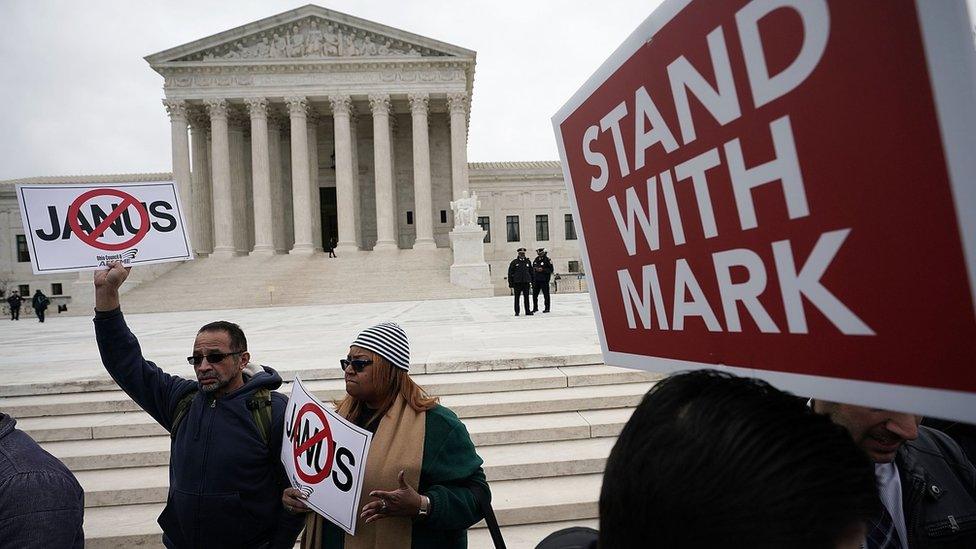US Supreme Court rules public sector union fees violate first amendment
- Published

Activists at the Supreme Court earlier this year when the case was heard
The top court in the US has ruled that states and public sector unions may no longer collect fees from workers without their consent, a defeat for supporters of organised labour.
The US Supreme Court said such fees are unconstitutional and force people to support ideas they may not believe.
It said that violates first amendment rights under the US constitution.
The 5-4 decision is expected to undermine the public unions' financial stability.
While the power of private sector unions have shrunk in recent years, more than a third of public sector workers remain represented by a union.
The organisations are a major force in political campaigns, typically offering support for the Democratic Party.
The case was brought by Richard Janus, an Illinois state employee who was represented by a union, but did not want to be a member because he objected to many of its positions.
Under prior law, public sector unions could collect a fee from non-members for their services, provided the money was not used toward political activities and other ideological work.
An estimated five million non-union workers currently pay such fees.
In Mr Janus's case, the fee represented about 78% of the total dues, or more than $500 annually.
'Judicial disruption'
Unions have said such fees are important, arguing they are essential due to "free riders" who would benefit from the pay and other perks secured by unions on behalf of their members.
In the majority opinion, Justice Samuel Alito said concerns about free riders could not override considerations for the first amendment, and overturned a prior ruling allowing the fees.
The decision was opposed by the court's liberal justices.
Justice Elena Kagan wrote: "Across the country, the relationships of public employees and employers will alter in both predictable and wholly unexpected ways…Judicial disruption does not get any greater than what the Court does today."
Richard Trumka, president of the AFL-CIO, which includes the American Federation of State County and Municipal Employees, said the decision showed the court "has conceded to the dark web of corporations and wealthy donors who wish to take away the freedoms of working people".

A look at the UK
Analysis by Natalie Sherman
The Supreme Court's decision, which limits labour union's rights to collect fees, is viewed as dealing a potentially fatal blow to the organisations.
A look at the UK, where trade unions collect a separate levy from members to fund political activities, is instructive.
In 2015, the government proposed to change the rules so that members would have to opt in to paying the political levy, rather than - as it currently stands - leaving them to opt out if they choose.
Opponents decried the plan as an attempt to undermine Labour Party finances. Indeed, a previous experiment with such a change had triggered a precipitous decline in contributions.
This time around, the plan was defeated.
Still, membership in UK trade unions is hovering near record lows, suggesting the challenges facing such organisations extend beyond their funding.

- Published26 February 2018

- Published4 June 2018